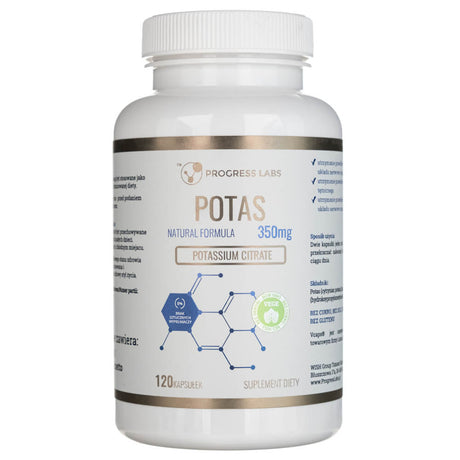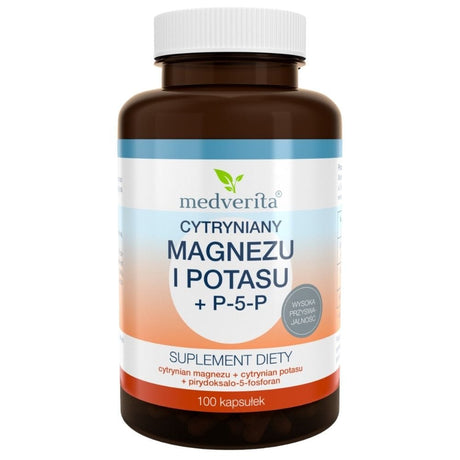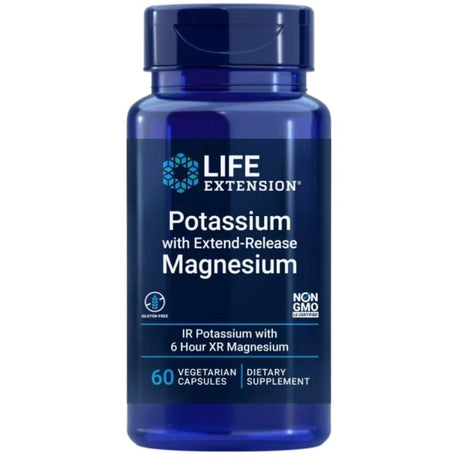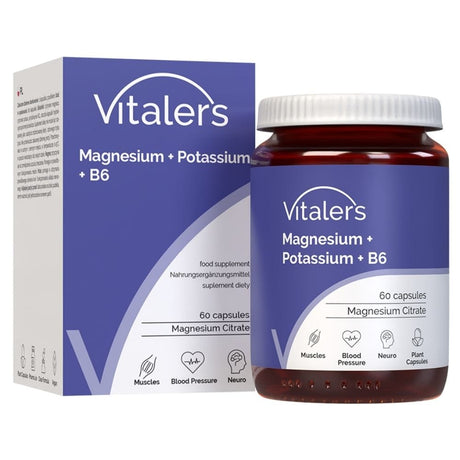Trace Minerals Research
Trace Minerals Research 40,000 volt elektrolytkoncentrat - 237 ml
Ordinarie pris 253.59 krEnhetspris1,070.00 kr /lProgress Labs
Progress Labs Kaliumcitrat 350 mg - 120 kapslar
Ordinarie pris 87.39 krEnhetspris0.73 kr varderaActivlab
Activlab Pharma Kalium SR 320 mg - 100 kapslar
Ordinarie pris 52.59 krEnhetspris0.53 kr varderaMedverita
Medverita Magnesium- och kaliumcitrater + P-5-P - 100 kapslar
Ordinarie pris 66.09 krEnhetspris0.66 kr varderaSwanson
Swanson Kaliumglukonat 99 mg - 250 kapslar
Ordinarie pris 269.19 krEnhetspris1.08 kr varderaNow Foods
Now Foods Kaliumglukonat 99 mg - 250 tabletter
Ordinarie pris 165.99 krEnhetspris0.66 kr varderaWish Pharmaceutical
Wish Kaliumcitrat 350 mg - 120 kapslar
Ordinarie pris 88.59 krEnhetspris0.74 kr varderaWellbear
Wellbear Magnesium 100 mg + Kalium 150 mg + Vitamin B6 10 mg - 60 kapslar
Ordinarie pris 122.99 krEnhetspris2.05 kr varderaPurelab Marek Skoczylas
Skoczylas Kalium, Kalcium, Fosfor - 60 kapslar
Försäljningspris 133.03 kr Ordinarie pris 140.09 krEnhetspris2.22 kr varderaLife Extension
Life Extension Kalium med magnesium med fördröjd frisättning – 60 kapslar
Ordinarie pris 179.49 krEnhetspris2.99 kr varderaTrace Minerals Research
Trace Minerals Research ConcenTrace ® Mineraldroppar - 118 ml
Ordinarie pris 412.29 krEnhetspris3,493.98 kr /lVitaler's
Vitaler's Magnesium 100 mg + Kalium 150 mg + Vitamin B6 6 mg - 60 kapslar
Ordinarie pris 78.49 krEnhetspris1.31 kr varderaPrimaBiotic
PrimaBiotic Magnesium + Kalium + Vitamin B6 – 60 tabletter
Ordinarie pris 75.79 krEnhetspris1.26 kr vardera
Kalium: En viktig mineral för optimal kroppsfunktion
Kalium är en viktig mineral som är avgörande för att alla biologiska enheter i människokroppen ska fungera optimalt. Dess primära roll är att upprätthålla en stabil elektrolytbalans och reglera jämvikten mellan sura och basiska ämnen. Detta mineral har en betydande inverkan på olika fysiologiska system och organ. Men, både brist och överskott av kalium kan leda till negativa hälsoeffekter, vilket gör det viktigt att upprätthålla lämpliga nivåer för övergripande välbefinnande.
Förstå kaliumets roll i kroppen
Kalium är ett spårmineral som främst finns i celler, som utgör upp till 98% av mineralets totala närvaro i kroppen. Dess fördelning är främst i muskler, med de återstående 20% fördelade på röda blodkroppar, ben, och levern. Som elektrolyt, uppvisar kalium hög reaktivitet när det kombineras med vatten, och producerar positivt laddade joner som leder impulser genom hela kroppen. Denna egenskap är avgörande för många grundläggande fysiologiska processer.
Viktiga funktioner hos kalium inkluderar:
- Reglera vattennivåerna i cellerna
- Balansera natriumets verkan utanför cellerna
- Upprätthålla vätskebalansen för den allmänna hälsan
Kaliums mångfacetterade effekter på kroppens funktioner
Kaliums inflytande sträcker sig till olika aspekter av människans fysiologi. Experter lyfter fram dess betydelse i:
- Stödja aktionspotentialer i nerv- och muskelvävnad
- Reglera hormonutsöndring och hormonkontroll
- Upprätthålla pH-balans
- Kontrollera systemiskt blodtryck
- Stödja vaskulär tonus
- Reglerar glukos- och insulinmetabolismen
- Kontrollerar motiliteten i mag-tarmkanalen
Forskning har visat att ett ökat dagligt kaliumintag är förknippat med en lägre risk för stroke och kan bidra till att förebygga njurar stenar. En kaliumrik kost är särskilt fördelaktig för äldre vuxna, eftersom den hjälper till att bibehålla tillräcklig muskelmassa.
Kaliumkällor i kosten
Det är viktigt att säkerställa ett tillräckligt kaliumintag genom kosten. Rika källor till kalium inkluderar:
- Frukt: apelsiner, grapefrukt, bananer, kiwi
- Grönsaker: potatis, spenat, persilja, broccoli, gurka, zucchini, morötter
- Fisk: tonfisk, hälleflundra, torsk, öring
- Nötter: särskilt mandel och pistagenötter
- Kött: inklusive nöt- och fläskkött
- Fullkornsprodukter
Det är viktigt att notera att färska produkter är den bästa källan till kalium, eftersom värmebehandling kan orsaka förluster på upp till 60% av det ursprungliga kaliuminnehållet.
Upprätthålla adekvata kaliumnivåer
Experter betonar att det är avgörande för kroppens homeostas att upprätthålla korrekta kaliumnivåer. Både brist och överskott kan orsaka negativa effekter, som eventuellt kräver medicinsk intervention. Att förstå tecken och symtom på obalans är viktigt för att förebygga hälsorisker.
Hyperkalemi: Riskerna med för mycket kalium
Hyperkalemi uppstår när kroppen har en för stor mängd kalium. Även om det är sällsynt, kan det drabba personer med dålig njurfunktion eller urinvägssjukdomar. Symtom kan inkludera onormal hjärtfunktion eller illamående, men vissa människor kanske inte uppvisar märkbara tecken. Vid misstanke om hyperkalemi, måste kaliumtillskott omedelbart avbrytas och läkare kontaktas.
Hypokalemi: Att känna igen kaliumbrist
Kaliumbrist, eller hypokalemi, uppstår vanligtvis när kroppen plötsligt förlorar en betydande mängd av mineralet. Vanliga orsaker är kräkningar, diarré, eller intensiv fysisk träning som leder till betydande vattenförlust. Medan mild hypokalemi kan ge lätta symtom, kan allvarliga fall leda till allvarliga hälsoproblem.
Symtom på kaliumbrist kan inkludera:
- Muskelsvaghet och/eller kramper
- Tillfällig tarmobstruktion
- Trötthet och apati
- Minskad reflexrespons
I allvarliga fall kan, symtomen eskalera till:
- Andningsproblem
- Förändringar i hjärtrytmen
- Muskelförlamning
Slutsats: Att förstå vikten av kalium
Att upprätthålla korrekta kaliumnivåer är avgörande för den allmänna hälsan och välbefinnandet. Genom att förstå kaliumets roll i kroppen, och känna till rika kostkällor, och vara medveten om tecken på obalans, kan du vidta proaktiva åtgärder för att säkerställa optimala kaliumnivåer. Kom ihåg, att kaliumbrist kan vara livshotande, men att det är relativt lätt att förebygga genom en balanserad kost och, vid behov, lämpligt tillskott.
Om du är orolig för dina kaliumnivåer eller överväger att ta tillskott, bör du rådgöra med hälso- och sjukvårdspersonal för att fastställa det bästa tillvägagångssättet för dina individuella behov. Utforska vårt utbud av högkvalitativa kaliumtillskott hos Medpak för att stödja din allmänna hälsa och ditt välbefinnande.




































